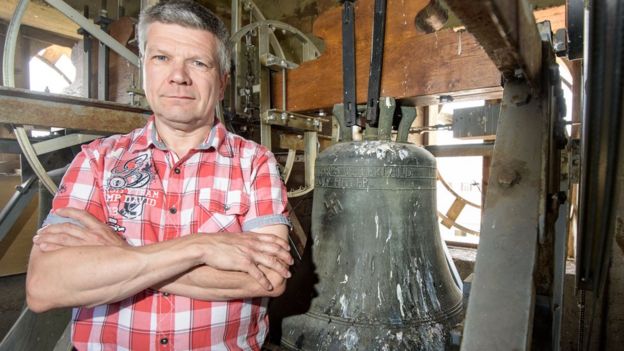To Adolph, With Love and Respect
"We will not allow the rest of the world to dictate what we do with our bell."
"It's a monument of history. We shouldn't forget that history or pretend it didn't happen."
"That is why the bell should stay."
Herxheim Mayor Georg Welker, 72, former village pastor
 |
| A view of a bell inside the Protestant Church of St. James in Herxheim am Berg, Germany, on June 12. (Ronald Wittek/EPA) |
"We're talking about a bell that was hung during National Socialism and is dedicated to a mass murderer."
"Our whole postwar identity in Germany is built on a break from that history."
Markus Krauss, village metal worker, Herxheim, Germany
"We did spring cleaning. Not only the village cleaned, but also the bell. Of pigeon dung, of the filth of the National Socialists, who still threatened after 80 years to divide the village population, and hopefully also of the dirt that might have been thrown off about Schweringen."
"Schweringen is a village of clear, decent, intellectual, cosmopolitan citizens, and they will not simply stand by as the villagers are planning a split."
"In this hope, and as Christians for freedom, we have freed this bell from the signs of a time of guilt and abuse."
Unknown Schweringen activists' note
 |
| Parishioners in Herxheim were alarmed to find they had been married or had baptised children under the "Hitler bell" Getty Images |
After having admitted that the heated discussions in the village community revolving around Schweringen's Nazi bell that posed an "unprecedented challenge to the people in the church", Community Pastor Jann-Axel Hellwege also stated that the church was now in the process of assessing whether the damage that ensued when a vigilante group of citizens broke into the church tower to use an angle grinder to remove the swastika on the bell, had affected the bell's sound qualities -- and whether to take legal action.
An estimated two dozen towns in Germany -- when news of the "Hitler bell" discovered to still exist in Herxheim became national news -- checked their own bells to discover swastikas on them. Those towns wasted little time in expeditiously ridding themselves of the bells. But not in Schweringen in northern Germany, where town council prevaricated, and finally a group of townspeople took covert action to grind away the Nazi insignia. And not in Herxheim am Berg in the southwestern wine country of Germany.
Where, in 1934 the town's National Socialist mayor in his hilltop village of 780 people hung a bell with the inscription "Everything for the Fatherland -- Adolf Hitler", beside the swastika. One of the parishioners, retired music teacher Sigrid Peters who played the organ in the church, discovered the church bell's existence and protested that the bell hung inside the yellow church tower, with a rickety wooden staircase leading to it, be removed and destroyed.
"People have been getting married under the swastika and they didn't even know it", she said furiously. "It can’t happen that a baby is baptized and a bell with the words ‘Everything for the Fatherland’ is chiming." When she made her discovery, and refused to play the organ until the bell was removed, it quickly became public knowledge all over Germany where Jewish organizations demanded the bell be removed. The response of the local church council was to temporarily ban it from ringing, while the regional church body offered to provide a replacement.
The response in Herxheim to its new state of notoriety with its "Hitler bell", was divisive. Ms. Peters has been called a "traitor", and in defiance the local pizzeria has been receiving orders from some of the town's good citizens for "Nazi pizza". Many village residents want to retain the bell, despite the fact that for the past year their village has been mockingly dubbed the "Nazi village". Mayor Welker, elected a year ago on the promise to keep the bell, plans to place a plaque on the church wall to explain the bell's history.
"For me, it is incomprehensible that such a bell was ever stuck in a church."
"I have even less understanding that there are obviously still people who hold a positive attitude toward this bell."
Josef Schuster, president, Central Council of Jews in Germany
“When we talk about the name Adolf Hitler, it will forever be associated first and foremost with the persecution of the Jews and the time of the war."
"But when you talk about these things, you have to see the whole picture, and say, yes, there were atrocities, but there were also things [Hitler] introduced which we still use today."
Herxheim am Berg’s former mayor, Roland Becker Heil Hitler!
Labels: Crisis Management, Heritage, Nazi Germany, Political Realities
0 Comments:
Post a Comment
<< Home